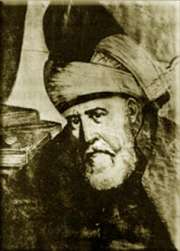|
Biography Mevlana Jalaluddin Rumi
Mawlānā Jalāl ad-Dīn Muḥammad Balkhī, also known as Jalāl ad-Dīn Muḥammad Rūmī, but known to the English-speaking world simply as Rumi, (30 September 1207 ÔÇô 17 December 1273), was a 13th-century Persian poet, Islamic jurist, theologian, and mystic. Rūmī is a descriptive name meaning "the Roman" since he lived most of his life in an area called Rūm because it was once ruled by the Byzantine Empire.
According to tradition, Rumi was born in Balkh, Khorasan (now in Afghanistan), the hometown of his father's family. Scholars, however, argue that he was most likely born in Wakhsh, a small town located at the river Wakhsh in what is now Tajikistan. Wakhsh belonged to the larger province of Balkh, and in the year Rumi was born, his father was an appointed scholar there. Both these cities were at the time included in the Greater Persian cultural sphere of Khorasan, the easternmost province of historical Persia, and were part of the Khwarezmian Empire.
His birthplace and native language both indicate a Persian heritage. Due to quarrels between different dynasties in Khorasan, opposition to the Khwarizmid Shahs who were considered devious by Bahā ud-Dīn Walad (Rumi's father) or fear of the impending Mongol cataclysm, his father decided to migrate westwards. Rumi's family traveled west, first performing the Hajj and eventually settling in the Anatolian city Konya (capital of the Seljuk Sultanate of Rum, now located in Turkey). This was where he lived most of his life, and here he composed one of the crowning glories of Persian literature which profoundly affected the culture of the area.
He lived most of his life under the Sultanate of Rum, where he produced his works and died in 1273 CE. He was buried in Konya and his shrine became a place of pilgrimage. Following his death, his followers and his son Sultan Walad founded the Mawlawīyah Sufi Order, also known as the Order of the Whirling Dervishes, famous for its Sufi dance known as the samāʿ ceremony.
Rumi's works are written in the New Persian language. A Persian literary renaissance (in the 8th/9th century) started in regions of Sistan, Khorāsān and Transoxiana and by the 10th/11th century, it reinforced the Persian language as the preferred literary and cultural language in the Persian Islamic world. Although Rumi's works were written in Persian, Rumi's importance is considered to transcend national and ethnic borders. His original works are widely read in their original language across the Persian-speaking world. Translations of his works are very popular in other countries. His poetry has influenced Persian literature as well as the literature of the Urdu, Bengali, Arabic and Turkish languages. His poems have been widely translated into many of the world's languages and transposed into various formats; He has been described as the "most popular poet in America" in 2007.
Rumi was born in present day Afghanistan, in the city of Balkh. His life is described in Shams ud-Din Ahmad Aflāki's Manāqib ul-Ārifīn (written between 1318 and 1353). Rumi's father was Bahā ud-Dīn Walad, a theologian, jurist and a mystic from Balkh, who was also known during his lifetime as Sultan al-Ulama or "Sultan of the Scholars". His mother was Mu'mina Khātūn.
When the Mongols invaded Central Asia sometime between 1215 and 1220, Baha ud-Din Walad, with his whole family and a group of disciples, set out westwards. On the road to Anatolia, Rumi encountered one of the most famous mystic Persian poets, 'Attar, in the Iranian city of Nishapur, located in the province of Khorāsān. 'Attar immediately recognized Rumi's spiritual eminence. He saw the father walking ahead of the son and said, "Here comes a sea followed by an ocean." He gave the boy his Asrārnāma, a book about the entanglement of the soul in the material world. This meeting had a deep impact on the eighteen-year-old Rumi, and later on became the inspiration for his works.
From Nishapur, Walad and his entourage set out for Baghdad, meeting many of the scholars and Sufis of the city. From there they went to Baghdad, and Hejaz and performed the pilgrimage at Mecca. The migrating caravan then passed through Damascus, Malatya, Erzincan, Sivas, Kayseri and Nigde. They finally settled in Karaman for seven years; Rumi's mother and brother both died there. In 1225, Rumi married Gowhar Khatun in Karaman. They had two sons: Sultan Walad and Ala-eddin Chalabi. When his wife died, Rumi married again and had a son, Amir Alim Chalabi, and a daughter, Malakeh Khatun.
On 1 May 1228, most likely as a result of the insistent invitation of 'Alā' ud-Dīn Key-Qobād, ruler of Anatolia, Baha' ud-Din came and finally settled in Konya in Anatolia within the westernmost territories of the Seljuk Sultanate of Rûm.
|




